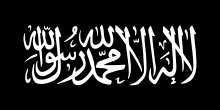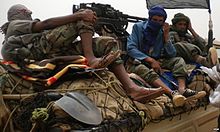Jihadism
The jihadism (also, on the basis of the spelling of English, Jihadism ) is a non-uniform flow of the militante extremist Sunni Islam in its SALAFIST expression. Its supporters, the jihadists , who justify Islamic terrorism , assume that Islam will lose power, culture and influence as a result of globalization, modernization and capitalismas a religion and political system and derive from this the collective claim of the Muslims and the individual self-commitment of the jihadists to achieve a resurgence of “Ur-Islam” in its radicalized Salafist reading, which has only recently emerged. According to the stylization of the jihadists, the reference period or ideal Islam embellished ideologically for this is indeed early Islam, i.e. the time of Mohammad and his immediate successors or legitimate caliphs , which is understood as the rise and heyday of Islam. The more utopianThe ideals of many jihadists, however, are not necessarily historically guaranteed, but are fed from a confusing multitude of sexual fantasies, political conspiracy theories , cultural myths , pseudo-historical legends and all kinds of religious fragments. Some interpretations, motifs and signs of jihadism could therefore seep into general youth culture and into Muslim popular cultures, in some cases they also emerged from these, which is occasionally described as "pop Islamism". Jihadism is particularly attractive in the non-Islamic diaspora for socially declassified Muslims (predominantly young sons from former immigrant families), as they can use specially selected set pieces of the jihadist ideology to invent an individually tailored worldview that allows them to go beyond the everyday Islam of the Muslim world to arrange one's own perception of the social environment according to subjectively plausible patterns, to interpret the incomprehensible logically, to process one's own wishes and fears. The missionary zeal of many jihadists results from their elitist self-image of being exemplary witnesses of a “true” Islam or of fighting as the avant-garde of an Islamic resurgence. The criticism and violence of jihadism is therefore directed (contrary to its propaganda and public clichés) mostly against the mass of ordinary Muslims themselves and against majority Islam in all its forms.
Jihadism became internationally known in particular through the assassination attempt on Anwar as-Sadat , whose group of perpetrators formulated their motives in detail. For some years now, jihadists have been promoting the establishment and expansion of the sphere of power of an Islamic state by means of violence and terrorism . Jihadism refers to the Islamic concept of petty jihad , which it interprets as the religious obligation of every Muslim to fight violently in defense of Islam against unbelievers , among whom it includes members of other religions as well as Muslims of dissenting convictions.
history
The influential ideological roots of jihadism include Wahhabism , which emerged on the Arabian Peninsula in the 18th century , as well as the Muslim Brotherhood established by the Egyptians Sayyid Qutb and Hasan al-Bannā in the middle of the 20th century and their Pakistani counterpart Jamaat, which was shaped by Sayyid Abul Ala Maududi . e-Islami counted. The early jihadist groups include the at-Takfir wa-l-Higra and al-Jihad , which were founded in the 1970s as a split from the Muslim Brotherhood, and which drew attention to several Egyptian state representatives through terrorist attacks , including the 1981 assassination of President Anwar el- Sadat .
The early organizational forms of jihadism in Afghanistan in the 1980s as a result of the Soviet invasion at the end of 1979 received great international approval and worldwide popularity , as Islamist mujahideen with the support of Pakistan, Saudi Arabia and the United States against the Soviet army and the communist it supports Government fought. The Palestinian theologian Abdallah Azzam was one of the most influential promoters of the religiously motivated participation of Arab Muslims in the war in Afghanistan. From the 1990s onwards, his supporter Osama bin Laden became the leading representative of the now cross-border jihadist movement with the international al-Qaida network he had built up . After the successful partisan war in Afghanistan, the focus of jihadist activity shifted to terrorism , with the attacks against the United States on September 11, 2001 having a prominent international impact. Independent of al-Qaeda, powerful jihadist groups emerged from the 1990s in Somalia ( al-Schabaab ), Pakistan ( Laschkar e-Taiba ), Russia ( Caucasus Emirate ) and Indonesia ( Jemaah Islamiyah ).
The occupation of Iraq by international troops that followed the US-led Iraq war of 2003 provided a new arena for jihadist organizations to attack and engage in international attention and capture a variety of resources. In the so-called " Iraqi Resistance " several competing groups fought in parallel. While al-Qaeda was the declared main opponent of the " war on terror " proclaimed by US President George W. Bush , the organization changed its structure in favor of stronger regionalization with the development of different focuses in the Maghreb , Yemen, Somalia and Afghanistan and Pakistan. In the course of the popular uprisings of the “ Arab Spring ” from 2010, further jihadist groups emerged in Tunisia , Egypt, Libya and Syria . Already in the middle of the first decade it had been shown that the al-Qaeda network, based on trans and internationality, was more flexible than more regional jihadist groups, but also less organizational. The pressure of persecution on global jihadists is currently leading to a clear shift in power within jihadism, because locally and regionally anchored currents can establish themselves more permanently, more numerous, more efficiently and politically more powerful than scattered and only ideally connected individuals and small groups.
In 2014, the Islamic State (IS) militia achieved leadership status within the jihadist movement that rivaled al-Qaeda by conquering a large contiguous territory in northwestern Iraq and eastern Syria and seizing large arsenals from the Iraqi army. After the massive persecution of minorities with massive human rights violations and human rights crimes, in particular the genocide of the Yazidis in northern Iraq and several media-effective beheadings of Western hostages , the IS became the target of military intervention from August 2014 to March 2019 by the International Alliance against the Islamic State in the form of air strikes in Iraq and Syria, as well as protracted ground fighting carried out by the Iraqi armed forces , the Kurdish Peshmerga and the Kurdish Yekîneyên Parastina Gel militia. In September 2014, the UN Security Council, in its unanimously adopted Resolution 2178 , directed itself against international phenomena of terrorism and explicitly named IS (under its older name ISIL), the al-Nusra Front and others associated with or arose from al-Qaeda Groupings. At this time, estimates by the United Nations were based on more than 13,000 foreign fighters from over 80 countries who had joined IS and al-Nusra.
On the part of the International Islamic Scholars' Council, violent jihadism in any form was already sharply condemned in the Mecca Manifesto in January 2002 and withdrawn from any cover by Islam or the Koran . With the statement “Jihad is not terrorism”, the manifesto demands an unarmed jihad committed to peace from all Muslims.
Jihadist groups (selection)
literature
- Jarret Brachman: Global Jihadism: Theory and Practice. Routledge, London 2008, ISBN 978-0-415-45242-7 . (English)
- Jeevan Deol, Zaheer Kazmi (eds.): Contextualising Jihadi Thought. C. Hurst & Co, London 2012, ISBN 978-1-84904-130-0 . (English)
- Asiem El Difraoui : Al-Qaida par l'image. La prophétie du martyre. PUF, Paris 2013, ISBN 978-2-1305-8669-2 . (French)
- Peter Heine : The belief of the jihadists. In: Peter Heine: Terror in Allah's Name. Extremist forces in Islam. Herder, Freiburg 2001, ISBN 3-451-05240-7 , pp. 124-132.
- Sebastian Huhnholz: Jihadist Spatial Practice. Spatial planning challenges of militant Sunni fundamentalism. LIT, Berlin 2010, ISBN 978-3-643-10546-2 .
- Rüdiger Lohlker : Jihadism. Materials. Facultas, Vienna 2009, ISBN 978-3-8252-3132-3 .
- Rüdiger Lohlker & Tamara Abu-Hamdeh (eds.): Jihadi Thought and Ideology (= Jihadism and terrorism. 1). Logos, Berlin 2014, ISBN 978-3-8325-3705-0 . (English)
- Peter R. Neumann : The new jihadists: ISIS, Europe and the next wave of terrorism. Econ-Verlag, 2015, ISBN 978-3430202039
- Thomas Schmidinger : Jihadism. Ideology, prevention and deradicalization . Mandelbaum, Vienna, 2nd edition, revised edition 2016, ISBN 978-3-85476-523-3 .
-
Guido Steinberg : Al-Qaida's German fighters. The globalization of Islamist terrorism. Edition Körber Foundation, Hamburg 2014, ISBN 978-3-89684-162-9 .
- English translation: German Jihad. On the internationalization of Islamist terrorism. University Press, New York 2013, ISBN 978-0-231-15992-0 .
- Bassam Tibi : From Classic Jihad to Terrorist Jihadism. The Islamists' Irregular War and the New World Disorder. In: Uwe Backes & Eckhard Jesse (eds.): Yearbook Extremism & Democracy . Volume 14. Nomos, Baden-Baden 2002, ISBN 3-7890-8254-6 , pp. 27-44.
- Khadija Katja Wöhler-Khalfallah: Islamic Fundamentalism. From the original community to the German Islam Conference . Verlag Hans Schiler, Berlin 2009, ISBN 978-3-89930-229-5 .
Web links
- Jihadica: Documenting the Global Jihad , scientific blog on jihadism research.
- Rauf Ceylan : Fundamentalism, Islamism and Jihadism as Anti-Modernist Counter-Drafts (PDF), contribution to peace and conflict research in the yearbook of the Osnabrück Peace Talks 2012.
- Andreas Keller: Jihadism as a transnational social movement (PDF), Institute for Ethnology, Ludwig Maximilians University, Munich 2011.
- Rüdiger Lohlker: Jihadism ,, in: Dossier Islamism of the Federal Agency for Civic Education , November 7, 2011.
- Jochen Müller and Götz Nordbruch : Jihadism on: ufuq.de .
- Guido Sternberg (Ed.): Jihadism and Internet: A German Perspective (PDF), SWP Study, Science and Politics Foundation , Berlin 2012.
- Federal Office for the Protection of the Constitution: Jihadism as an ideology of violence - the abuse of Islam for terrorist purposes,, website of the BfV, undated .
- Theo Sommer : The Saudis feed the jihad , January 20, 2015.
- Andreas Armborst: The seeds of violence , in: Katapult , July 8, 2015.
- Hammad Sheikh: The three basic forms of jihad , December 15, 2015.
Individual evidence
- ↑ See Johannes JG Jansen: The Creed of Sadat's Assassins. The Contents of “The Forgotten Duty” analyzed. In: The world of Islam . Volume 25, 1985, pp. 1-30 and Rudolph Peters: Jihad in Classical and Modern Islam. Markus Wiener Publishing Inc., Princeton 2005, pp. 160-167. The text is printed in Ǧād al-Ḥaqq ʿAlī Ǧād al-Ḥaqq: Kutaiyib al-Farīḍa al-Ġāʾiba wa-r-Radd ʿalaihī al-Mabādiʾ . In: al-Fatawā al-Islāmīya min Dār al-Iftāʾ al-Miṣrīya . Volume 10. Dār al-Iftāʾ, Cairo 1983, Appendix: Naṣṣ Kitāb al-Farīḍa al-Ġāʾiba pp. 3762–3792. English translation in Johannes JG Jansen: The Neglected Duty. The Creed of Sadat's Assassins and Islamic Resurgence in the Middle East . Macmillan Publishing Company, New York 1986, pp. 159-230.
- ↑ Khadija Katja Wöhler-Khalfallah: Islamic Fundamentalism: From the Urgemeinde to the German Islam Conference. Hans Schiler, Berlin 2009, pp. 70–180.
- ↑ a b Rüdiger Lohlker: Jihadism, in the Islamism dossier of the Federal Agency for Civic Education of November 7, 2011.
- ↑ Sebastian Huhnholz: Jihadist spatial practice. Spatial planning challenges of militant Sunni fundamentalism . LIT, Berlin 2010, ISBN 978-3-643-10546-2 .
- ↑ Sebastian Huhnholz: Jihadism and Territoriality. A political-theoretical perspective on the causes, conditions and consequences of a lack of territorial thinking in militant Sunni fundamentalism . In: Jochen Kleinschmidt et al. (Ed.): The terrorized state. Delimitation phenomena of political violence . Steiner, Stuttgart, ISBN 978-3-515-10117-2 , pp. 189-216 .
- ↑ Sebastian Huhnholz: Returning to the Caliphate? Historical origins and current consequences of the sacred geography of jihadism . The Peace Watch. Journal of International Peace and Organization, 3-4 (90th year), 2015, ISBN 978-3-8305-3683-3 , pp. 311-339 .
- ↑ a b c UN accuse IS genocide March 19, 2015 ZEIT ONLINE , accessed August 12, 2016.
- ↑ Security Council Unanimously Adopts Resolution Condemning Violent Extremism, Underscoring Need to Prevent Travel, Support for Foreign Terrorist Fighters, United Nations press release from September 24, 2014
- ↑ " Jihad is not Terrorism". English translation of the Mecca Manifesto (Terrorism. Islam's Viewpoint) in: The Muslim World League Journal, Jumada l-ula 1423 / July 2002. Online reprint , accessed January 30, 2016.

